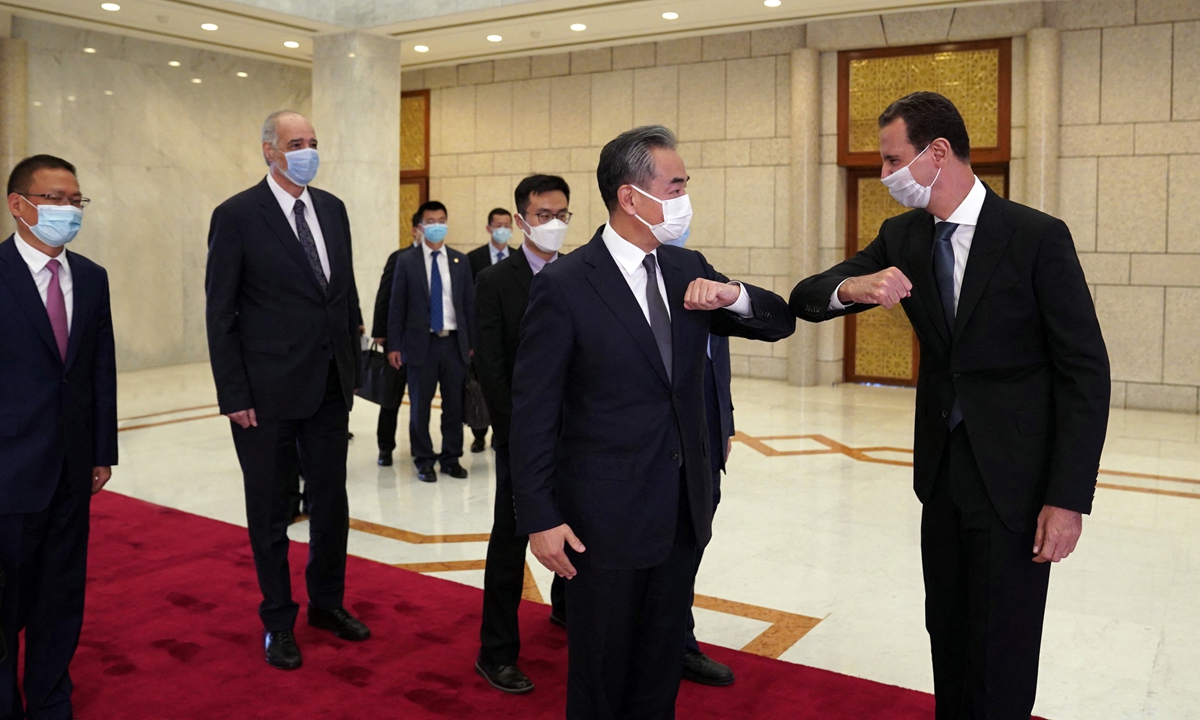
Photo: AFP
After concluding a weeklong visit to some Central Asian countries, shedding light on regional stability, especially China's approach on the political settlement of the Afghan issue, Chinese State Councilor and Foreign Minister Wang Yi visited Syria on Saturday and is scheduled to visit Egypt as well as Algeria this week, underscoring China's independent foreign policy, again striking a sharp contrast from the West, while also unleashing a positive message to the Middle East in countering the negative influence of the US.
Since the establishment of diplomatic ties 65 years ago, China and Syria have always trusted and supported each other, Wang said during a meeting with Syrian President Bashar al-Assad in Damascus, the first stop of his four-day official trip to Syria, Egypt and Algeria from Saturday to Tuesday.
Syria has made remarkable achievements in
combating terrorism and opposing external interference under the leadership of Assad, Wang said, noting that Assad's reelection reflects the strong trust and support of the Syrian people.
On the same day when Assad met with Wang Yi, , the Syrian president was sworn in for his fourth seven-year term, after he won reelection with over 95 percent of the votes on May 27, according to media reports. Chinese observers believe the timing of the Assad-Wang meeting embodies the significance of the China-Syria relationship.
Since Syria's brutal conflict broke out years ago, some Western countries including the US opposed to Assad, blatantly interfered in Syria's internal affairs. Contrary to the West-led condemnation of the Syrian government, China has taken a different position by not interfering in its internal affairs and respecting its sovereignty and territory integrity, Hua Liming, former Chinese ambassador to Iran and an expert on Middle East affairs, told the Global Times on Sunday.
"Now, with the withdrawal of US troops from Syria and Assad beginning his fourth term, the timing is significant as it shows China's independent foreign policy that is different from those of the Western countries, which has been proven to be the correct stance," Hua said.
During his visit in Central Asia last week, Wang reaffirmed China's position on the Afghan issue by saying that China will not interfere in internal issues in Afghanistan and has no geopolitical calculation about the region. China will continue to treat Afghanistan with respect for its sovereignty and independence.
Reaffirming China's strong support for Syria in safeguarding national sovereignty, territorial integrity and national dignity, Wang said that China opposes any attempt to seek regime change in Syria, noting that China will continue its strong support for Syria in handling domestic problems under the "Syrian-led, Syrian-owned" principle established by the UN Security Council.
Syria supports China unconditionally on issues related to Xinjiang, Hong Kong and the Taiwan question, Assad told Wang in their meeting. On the same day, Syrian Foreign Minister Faisal Mekdad said Syria condemns all conduct and deeds that smear China, opposes interference in China's internal affairs and Syria will always stand with China in any circumstance.
"Such support on questions such as Xinjiang and Hong Kong shows that China and developing countries support each other on their sovereignty and territory integrity. Not only Syria, but also all the Arab countries support China on those issues," Hua said.
During Wang's visit to six Middle East countries in March, for example, Saudi Arabia expressed support for China, opposing Western forces driving a wedge between China and the Islamic world and backing China's legitimate position on affairs related to Xinjiang and Hong Kong.
When envoys and diplomats from 20 Arab countries and the Arab League in China visited Northwest China's Xinjiang Uygur Autonomous Region in October 2020, they all spoke highly of the region's progress in counterterrorism and de-radicalization, protection of religious freedom, promotion of economic growth and livelihood.
Besides Syria, Wang is scheduled to visit Egypt and Algeria. His visit to the Middle East twice within six months shows that China hopes to further strengthen the relationship with Middle Eastern countries by treating them equally. After US officials recently visited the region, the visit of the senior Chinese official is expected to counter the negative impact of the US' influence, some experts said.
A US commander in the Gulf region warned that as the US scales back its military presence across the Middle East, it would risk giving those two countries - China and Russia - a chance to fill the gap and expand their influence around the region, the Associated Press reported in May. US Secretary of State Antony Blinken visited the Middle East in May after meeting with leaders of Egypt and Jordan to discuss rebuilding war-ravaged Gaza, which is seen as a sign the Biden administration's foreign policy priorities include competing with China, according to some media reports.
"Wang's visit aims to counter the possible negative impact made by the US," Tian Wenlin, a research fellow at the China Institutes of Contemporary International Relations, told the Global Times on Sunday. Tian said that some US officials have been lobbying in the region to try to curb China's presence.
Tian noted that China's support to Syria is not only a political gesture but also includes concrete measures to help the country rebuild in the post-war period and gain economic recovery, as the Middle Eastern country is facing a humanitarian crisis and severe food shortages.




